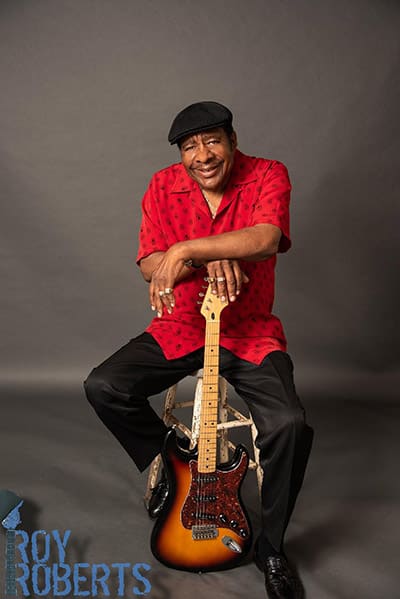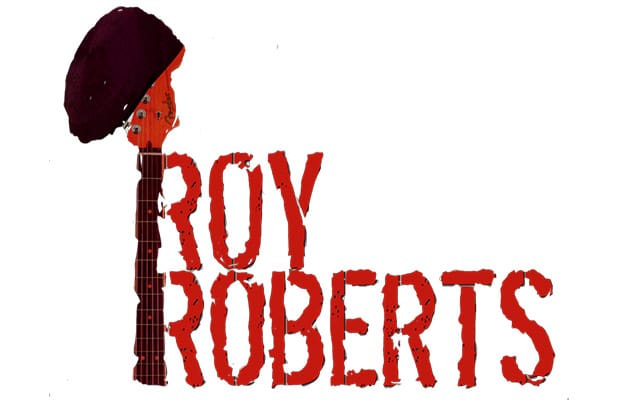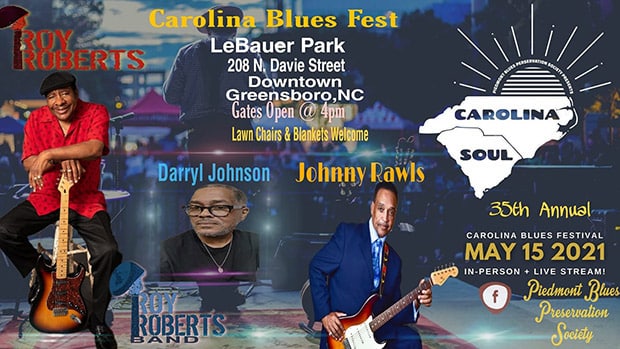
The headliner at one of the first blues festivals since the pandemic-caused lockdown has a unique career that includes decades of success in three separate musical styles.
Roy Roberts’ astute listening and learning as well as congeniality and ability to rise to the occasion brought about his amazing story. He’s been a bluesman for nearly three decades after starting his career as a member of the first band defined as playing soul music. In between, his most successful time on the stage was as a country artist when he was known as “The Chocolate Cowboy.”
Roberts, 79, headlines the Piedmont Blues Preservation Society’s 35th annual Carolina Blues Festival on Saturday in his hometown Greensboro, North Carolina, which will allow 500 spectators in LeBauer Park. Johnny Rawls, who has recorded and shared the stage with many times, also is featured.
Roberts has written perhaps 400 songs, produced numerous albums, most of which are gospel, and played with Otis Redding, Stevie Wonder and Solomon Burke, the latter being instrumental to landing Roberts on the national stage.
“It was 1962 and I was playing pretty decent and we had a nice little band and there was a club in town (Greensboro) called El Rocco – that’s where all the big entertainers came,” Roberts told Tahoe Onstage. “Every black entertainer that was out in the ‘50s and ‘60s came to that club.”
The touring entertainers were often backed by a local band. Roberts stopped by to “holler” at some of his friends who were preparing to play with Solomon Burke, the preacher-turned singing star. The bass player asked Roberts for help learning one of the songs. Roberts, whose first instrument was piano, was also already proficient at both guitar and bass.
“Burke came over and said, ‘You’re playing that just like it was recorded,’” Roberts said. Burke asked Roberts if he could play the gig, much to the relief of the other bassist, who said, “You are doing me a big favor.”
When Burke paid the young player after the show, he upped the ante: “Can you go on the road? Can you leave tonight?” The answer, of course, was yes.
“If you can take me to my mom’s house so I can pick up some clothes,” Roberts said. “She was excited because she always loved Solomon Burke’s music and she got to meet him.”
Burke was known as one of the biggest stars in R&B, but he disapproved of the description.
“He said, “This is not R&B. This is soul music. It’s music from the soul,” Roberts said.
Writers picked up on it, and the genre of soul music was born.
‘I’ll take that Jimi Hendrix guitar, please’
After about a month on the road, there was another revelation.
Roberts’ motel room in Saginaw, Michigan was open as he strummed a band member’s electric guitar. “King Solomon” heard the sounds and entered the room.
“You didn’t tell me you play guitar; that’s what I need!” Burke said.
“The guy he had on guitar played a lot of solos and you don’t go out there with an entertainer and do solos,” Roberts said. “You’ve got to play those chords and that good, strong rhythm, and I had it going on back then, man.”
Burke sent the guitar soloist back home in Louisiana and Roberts to a music store with cash to buy a guitar.
Roberts had admired the Fender Stratocaster ever since he saw a young player use one with the Isley Brothers. The guitarist was Jimi Hendrix.
“The way it felt the neck on that thing was just perfect for my hand,” Roberts said. “I had a Les Paul Gold Top. I gave that thing away and right now I could have retired with the money it would sell for ‘cause it was in real good condition.”
Roberts’ rise with Burke continued in Youngstown, Ohio.
‘Country as a dozen of eggs’
“Solomon had this guy who opened the show and this sucker got drunk or something and couldn’t come out and sing,” Roberts said.
Desperate, the bandleader asked each of his players if they could open the show. Like the others, Roberts at first said no.
“Coming out of Kentucky, I had a voice I was ashamed of.” Roberts said. “I was ashamed to talk it was so country. I was as country as a dozen of eggs. Everybody laughed at my voice when I talked. They teased me, ‘You sound like some old white man.’ ”
However, Burke pressed Roberts to lead the opening set.
“I am the type of guy if you push me in a corner, I’m coming out. I said, ‘OK, I’ll give it a shot.’ ”
Chuck Jackson had a couple of popular songs, “Any Day Now” and “I Wake Up Crying.” When Roberts sang them, “Man, the crowd started hollering and dancing and all of that and Solomon looks out of the dressing room because it was beside the stage and he looked out and gave me thumbs up. And I’m like Urkel, ‘Did I do that?’ ”
During the rest of his time with Burke, Roberts opened, and “I’ve been singing ever since.”
A week off before a show in Dayton, Ohio, allowed Roberts time to search for his father he’d never met. He’d heard that he was a successful businessman with a tire store that served the entire city.
“Everybody knew my dad but me. It sounds like another blues song,” Roberts said.
But when opportunity knocks, Roberts has a penchant for making the most of it.
“I pulled into a black neighborhood and the very first house I tried, the woman said she knew my dad and gave me directions to his shop.”
Both father and son were thrilled to meet each other. Roberts gave Burke a month’s notice to find another guitar player and then he moved to Dayton.
Roberts befriended Robert Ward who had a band, the Ohio Untouchables, which later became the Ohio Players. Robert would sometimes play with them, and he started his own band.
“I got tired of Dayton ‘cause you couldn t make any money,” he said “Back then the money was made in the South. The Ohio Players was playing $10 per man a night and a lot of people don’t believe that. But gas was about 17 cents a gallon and with $10 you could buy a couple meals and gas back then.”
‘Legend of Otis Redding’
Roberts moved back to North Carolina and for a while toured as a backup player to Otis Redding. Twelve-year-old “Little Stevie” Wonder was part of the tour. “He said I should come up to Detroit and record with Motown. But like I said, you could make more money in the South.”
Roberts eventually parted with Redding, however, he was offered a chance to reunite during a chance meeting in Greensboro.
“I happened to be coming down the street and there Otis and his band were sitting out front. I was playing with Eddie Floyd at the time. He said anytime you want a gig, all you have to do is call me and you’ve got the gig. If I’d hadn’t been playing with anybody, I’d have probably left with them.”
Six months later, Redding and his band, the Bar-Kays, died in a plane crash.
The tragedy inspired Roberts to record solo for the first time, making the single “The Legend of Otis Redding” with the flip side “Got To Have Your Love,” which became a hit song in Britain. (Roberts’ manager sold the publishing rights to Nina Simone.)
During the session, Roberts observed the producer and said, “That’s my job right there. I wanted to be the producer because I know what I want in the music and I know how to tell people how to play what I want if I’m doing my stuff. I started my own record company in 1970, House of Roton.”
Disco reared its four-on-the-floor beats in 1979, wiping out the live music industry for many, including Roberts. Not knowing what to do, Roberts consulted with Charlotte bluegrass player Arthur “Guitar Boogie” Smith.
“He laughed and said, ‘You can always come down here and play with me.’ I said, ‘Y’all play too fast for me.’ Then he said, ‘With your personality, you ought to go into country music.’ I said. ‘There you go again, Arthur. Do you think these people around here are going to let an all-black band come into these country and western clubs in North Carolina?’ He said, ‘’Yeah, you can do it. I wouldn’t tell too many other people, but I know you and your personality, you’ll figure out how to pull it off.’”
Roberts compared country music to blues: “It’s all about the same. Somebody done somebody wrong, or this lady left or this dude left. Country ain’t nothing but blues. It’s just played a little different when you throw the steel guitar in there.”
Two black men walk into a bar and there’s 600 cowboys
After six months with no work, Roberts manager suggested they take a trip to Madison, North Carolina to see the country artist Ernest Tubb. “This could be a way to get some doors open,” he said.
“We get up there and this club is jam packed with I’d guess 500 or 600 people,” Roberts said. “We go up there and walk through the ‘derned’ door and their ain’t another black person nowhere in sight except me and him. He’s scared and I’m not. I guess I ain’t got sense enough to be scared of anything. I grew up with white people on my grandfather’s farm all of my life. I didn’t even know what prejudice was until I came up to North Carolina in 1960.
“Everybody looked at us and you could have dropped a feather and heard it when it hit the floor. I had Sprite and my partner had a beer. The opening band that was playing, I knew them and they knew me. When they took a break, they ran over to greet me, shouting ‘Roy Roberts is in the house!’
“All these people were looking, ‘Who is this guy?’ They asked if I wanted to play a couple songs with them. You know what’s going through my head? This is going to be a door opener for me. Do you know ‘I Can’t Help Falling in Love’ by Elvis? And ‘I Can’t Stop Loving You.’ When I started doing my impression of Elvis Presley, the people started hollering and clapping and all of that, and I’m saying to myself, ‘Uh huh, I got you now.’ Then I played (Ray Charles’) ‘I Can’t Stop Loving You’ and then it was on and on.
“When I got ready to come off, they kept hollering more, more. I said, ‘I can’t do no more. This is these guys job. I’m not getting paid for this. If you want to hear more from me your gonna have to talk to the club owner over there and tell him to book me and my band over here.’ And sure enough man, it went like wildfire. That’s the hottest thing I’ve done in the music business from 1980 to ’89.”
A couple of years after the death of his onstage partner O.D. McClinton, Roberts felt burnt out. He built a studio in Danville, Virginia and made several records for gospel bands.
Listening to the radio one day, Roberts heard Robert Cray’s song “Phone Booth.”
“I said, ‘Listen to that. This guy and I got almost the same style of playing but I’m stuck up here in this studio and this dude’s out there making money.’ I wrote a couple of blues songs and cut those songs and from ‘93 on it’s been history. I’ve been playing the blues and it carried me through Europe and up in Canada, Japan. So I thought that was smart move for me.”

His latest album, “Nothin’ But The Blues” is a solid collection of original tunes featuring horns and a Memphis sound, plus one, “Just One More Blues Song,” written by Mark Van Mourik, a Holland native who was mentored by Roberts. During a European tour, Van Mourik and his father followed Roberts across several countries.
“His dad asked if he could stay a couple of months with me; They were looking for the right artist that they could trust with his son. He’d stay 90 days then come home. He did that three times. At 18, that boy could play like George Benson, Stevie Ray Vaughan, anybody.”
Van Mourik married Roberts’ keyboard player and lived in the United States for a few years. After having a child, they moved back to Holland.
During the pandemic, Roberts and his band made another record, “Covering The Years of Roy Roberts,” which is nearly ready for distribution. It features all of his musical styles, country, blues, gospel, soul, and Carolina beach music.
The band includes horn players Rusty Smith, Mark Black, Scott Adair, drummer Elwood Daniels, second guitarist A.J. Diggs, keyboardist Eric Callands and bassist Reggie Wall. They play in the studio and on the stage.
“There’s no drum machines, that takes away from the real deal,” Roberts said. “The real deal is when some guys can sit down in the studio and the bandstand.”
For the first time in more than a year, Roberts and his band will play a live show. One can almost imagine the excitement when the legendary player steps onstage and screams his familiar refrain, “It’s on!”
-Tim Parsons

